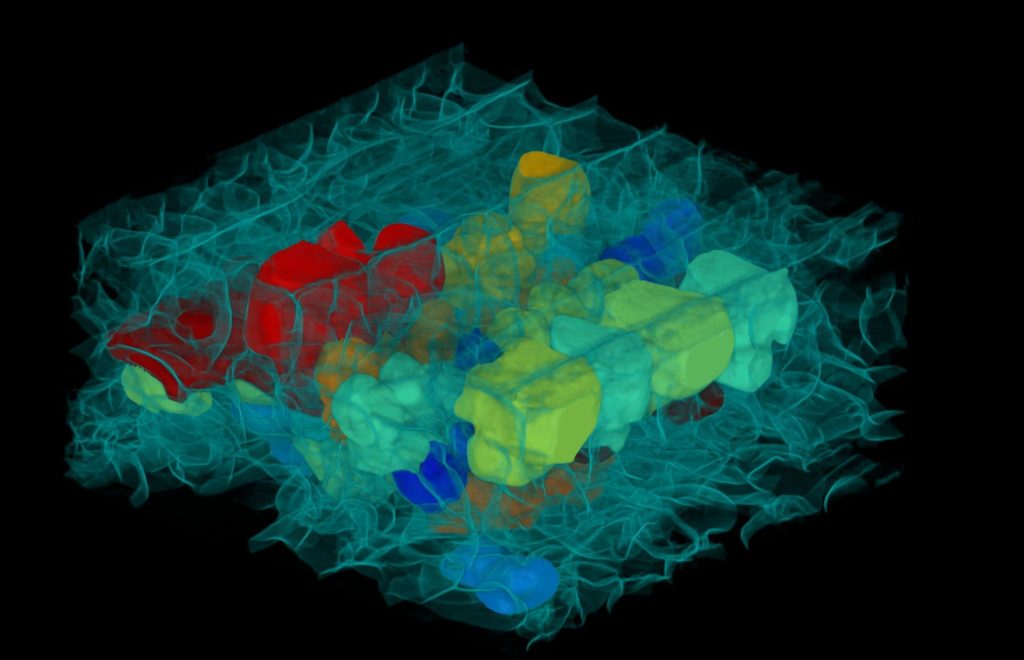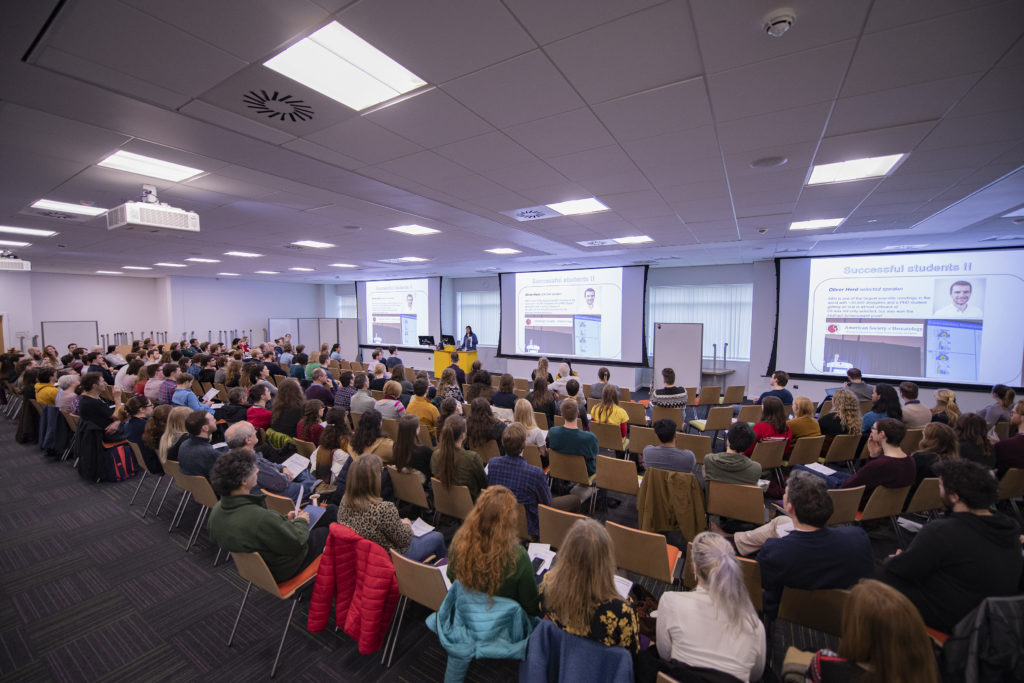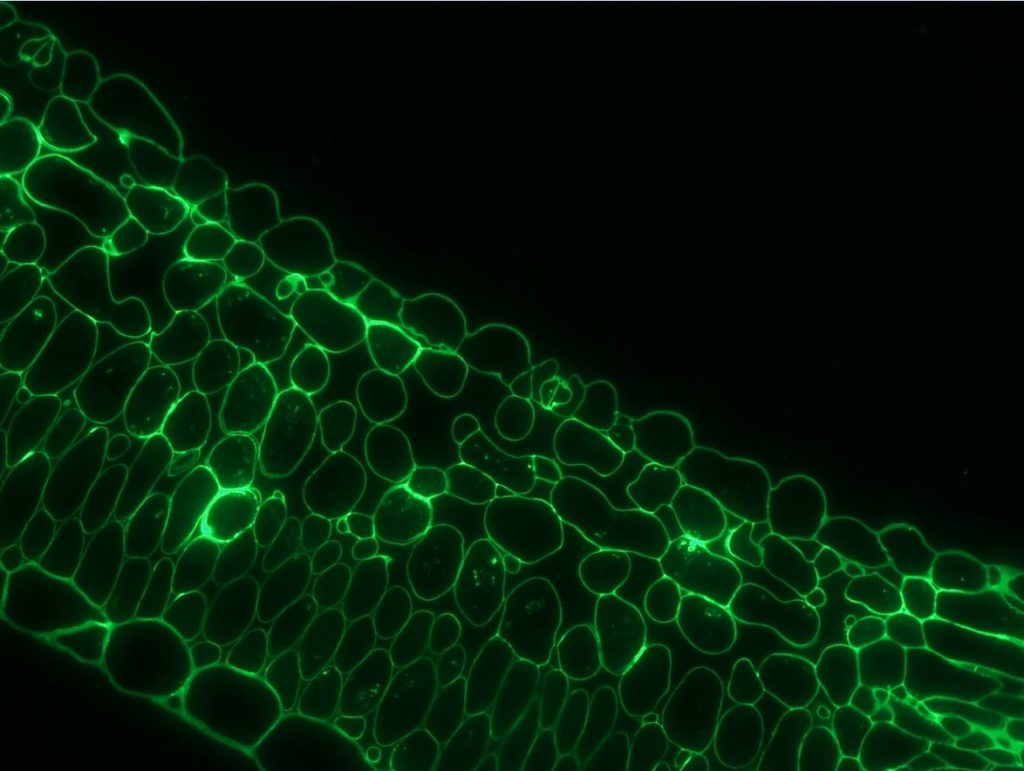For a summary of the 2022 symposium, including prize winners, please see our Symposium Archive page. For photos of the day check out our Symposium 2022 Gallery.
The symposium is being held at York University (Department of Biology, Wentworth Way, Heslington, York, YO10 5DD) in room T005. You can find directions on the York Biology website.
Key Deadlines
- Registration – Monday 17th October 2022
- Abstract submission (4th years only)- Monday 31st October 2022
- Talk types will be confirmed in November.
- Poster and Short Talk submission deadline – TBC.
About
The annual White Rose Mechanistic Biology DTP Symposium will be held as a fully in-person event, for the first time in 2 years, on Monday 12th December 2022 at the University of York. This event is held annually to celebrate the work of our 3rd and 4th year students, featuring various presentations that span a diverse range of research topics. This year the symposium theme is Science in Society.
The symposium is mandatory for all White Rose DTP students and this year will be in-person with no online streaming options as we work towards returning to pre-COVID arrangements.
Keynote speakers: During this year’s symposium we will have a couple of fantastic keynote speaker presentations, and a Q&A panel following the success of this format last year. These will support our theme of Science in Society. More information on the speakers will be revealed closer to the date.
What do I need to do?
This symposium is a fantastic opportunity to share the amazing research done by our 3rd and 4th Year students with the entire cohort.
- It is mandatory for 1st and 2nd year students to attend the symposiums but students will not be asked to present at the event.
- 3rd Year students will submit posters which will be presented in person at the symposium.
- 4th Year students will submit abstracts which will then be assessed by the symposium organising committee to determine which type of presentation they will give, either; Research presentation (10 minutes), Flash presentation (3 minutes) or a PIPS presentation (10 minutes). The link to the abstract submission form is below. We are working to get as many slots for 4th year research talks as possible into the agenda, but unfortunately not everyone will be able to speak given time constraints.
- Please note it is not mandatory for 5th Year students (final year students with extensions), NPIF or iCASE students to attend the symposium, although they are more than welcome to attend.
For more information see Registrations and Presentation Applications, Abstract submission and presentations.
Registration and Presentation Applications
Please complete this form to register by Monday 17th October 2022.
4th Year students must submit an abstract using this form by Monday 31st October 2022.
Abstract Criteria
Talk types will be determined by the symposium organising committee who will mark the 250 word abstracts using the following criteria:
1) Is the abstract accessible to a broader STEM audience?
2) Are the results interesting, novel and/or exciting?
3) Are the conclusions clear and concise? Do they reflect the aims?
4) Are the impacts and value of the findings clear?
It’s very important that your abstract is accessible to the wider scientific community as the WR DTP spans a variety of disciplines. Commons reasons for losing marks is using lots of jargon and assuming background knowledge! Please make the aims of the research clear as well.
Poster Guidelines
For this year’s Symposium the poster session will be in-person – this means you will need to
PRINT your poster and bring it with you to the symposium! You will also need to bring some
Velcro to hang your poster up on the felt poster boards. As in previous years, prizes for the
best posters will be awarded at the end of the symposium!
Criteria
- Portrait orientation
- Aspect ratio of 1:1.414 (this is the aspect ratio of standard paper sizes – A4, A0 etc)
- Good quality graphics and text which are easy to read
Content
- Appropriate logos (BBSRC, White Rose, your university)
- Poster title (keep it concise!)
- Names (your name in font that stands out, supervisor, collaborators) and institutions
- Introduction
- Methodology (optional)
- The main content is up to you, but your figures should be the dominant feature
- Conclusions
- References
Presentations
The annual symposium will host multiple different types of talks, specific details of each are found below:
- Research presentations (4th Years) – These are 8 minute live talks focused on ongoing or completed research, followed by 2 minutes of questions.
- Flash presentations (4th Years) – 3 minute short talks focussed on ongoing or completed research with no following questions.
- PIPS presentations – These are 8 minute live presentations about a student’s completed professional placement, followed by 2 minutes of questions.
- Poster presentations (3rd Years) – An A0 printed poster focussed on completed or ongoing research which will be displayed on poster boards in the York Atrium alongside refreshments.
Programme
Welcome 09:20 – 09:30
Session 1 09:30 – 11:00
Research & PIPS talks
Break 11:00 – 11:20
Session 2 11:20 – 12:30
Keynote: Richard Mallam
Research & PIPS talks
Poster Viewing 12:30 – 13:00
Lunch 13:00 – 14:00
Session 3 14:00 – 15:15
Q&A Panel
Research / PIPS talks
Break 15:15 – 15:30
Session 4 15:30 – 17:00
Research & PIPS talks
Keynote: Rupert Lewis
Prize giving & closing remarks 17:00 – 17:15
Networking & Refreshments 17:15 – 18:00
Coaches depart 18:00
Keynote Speakers
Dr Richard Malham – Head of Research Policy, Integrity and Governance, University of St Andrews (Session 2: 11:20 – 12:30)
Richard obtained a BSc in ‘Biochemistry with medical biochemistry’ from the University of Leeds in 2005. During this time he undertook a one year industrial placement, working in pharmaceutical R&D at GSK. After undergrad he started training to be a science teacher (ages 11-18), realising partway through the course that a teaching career was not for him. Before starting a 4-year Wellcome Trust PhD at the Astbury Centre (University of Leeds) in Autumn 2007, and around the teacher training, he worked in a range of administrative positions in mental hospitals and treatment units in south London. During the PhD he took advantage of almost all the training and careers development opportunities offered by the Wellcome Trust to the postgrad researcher students they fund, including the 3-month policy internship at the Academy of Medical Sciences in London. Following a successful internship, and completion of his PhD in early 2012, a Policy Officer job became available at the Academy for which Richard successfully applied. He worked there from May 2012 to July 2015 as a Policy Officer, then a Senior Policy Officer and finally a Policy Manager. At the Academy he worked on a wide range of topics including government support for research (in co-ordination with a wide range of science organisations), researcher career development, and on various medical research issues in the NHS and public policy. He moved to Scotland in 2015 for personal/family reasons, taking up a role firstly as a Research Policy Officer at the University of St Andrews, before becoming the Head of Research Policy, Integrity and Governance, building and leading a team in a newly formed Research and Innovation Services Unit. At St Andrews, Richard works on research policy issues that impact across the whole institution, including work on improving research culture. His team of specialists develop and provide a range of research-related mechanisms, including ethical review for research involving humans or animals, export controls, the Nagoya Protocol, governance of healthcare research, and the undertaking of investigations into allegations of research misconduct.
Dr Rupert Lewis – Chief Science Policy Officer at the Royal Society (Session 4: 16:00 – 17:00)
Dr Rupert Lewis is Chief Science Policy Officer at the Royal Society. The Royal Society is the independent scientific academy of the UK, dedicated to promoting excellence in science for the benefit of humanity, whose Fellowship include many of the world’s most distinguished researchers. The policy team lead work on climate, the biosphere, innovation and emerging technologies, data, science policy, education, and deliver rapid expert advice on SARS-Cov-2. Before joining the Royal Society Rupert led the Government Office for Science (GO-Science) which supports the Government’s Chief Scientific Adviser, providing science advice to the Prime Minister and to the Cabinet, carrying out strategic Foresight projects, and science advice in emergencies. His previous roles include head of Automotive policy, deputy Chief Scientific Adviser (BIS), and head of Climate Adaptation policy. He also set up the Prime Minister’s ‘Business Council for Britain’ during the financial crisis. Rupert has a BSc in Marine Biology, a PhD in genetics, and worked on aquaculture development and start-ups in SE Asia, South Africa, and Europe prior to joining Government in 2002.
Q&A Panel – Session 3: 14:00 – 15:15
Dr Sarah Harvey
Trainee Patent Attorney at Mewburn Ellis LLP
Dr Claire Stoker
Team Director at Spirit Medical Communications Group Limited
Dr Elspeth Ransom
Tree health policy lead, Defra
…………………………..
Image Competition
Thank you to everyone who has submitted images for our Symposium Imaging Competition. We have chosen our favourite images for use in our promotional material (hopefully you’ve spotted them!). Here are the winning entries:
Many congratulations to Patrick Hunter who has won the image competition with this great image captioned ‘More than meets the eye’!

Congratulations also to runners up Emma White & Robert Brench for their great submissions too!

BBSRC Themes
The DTP’s research addresses four of the BBSRC’s core strategic themes which are listed below for your information.
Advancing the frontiers of bioscience discovery
1) Understanding the rules of life (formerly World Class Underpinning Bioscience)
2) Transformative technologies (formerly Exploiting New Ways of Working)
Tackling strategic challenges
3) Bioscience for sustainable agriculture and food (formerly Agriculture and Food Security)
4) Bioscience for renewable resources and clean growth (formerly Industrial Biotechnology and Bioenergy)
The themes were updated by the BBSRC in 2019. For details, read Forward Look for UK Bioscience and see the Research Themes page.

More information coming soon: looking forward to seeing you soon!







